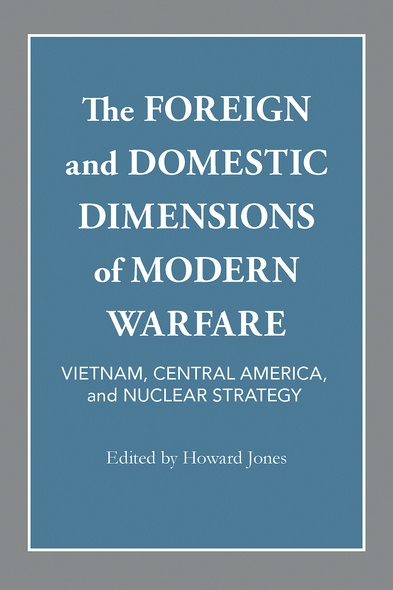The Foreign and Domestic Dimensions of Modern Warfare
Vietnam, Central America, and Nuclear Strategy
An exploration of the nuclear arms race and the dangers arising with the advent of “limited warfare”
After the development of the atomic bomb in 1945, Americans became engaged in a "new kind of war" against totalitarianism. Enemies and objectives slipped out of focus, causing political and military aims to mesh as a struggle to contain communism both at home and abroad encompassed civilians as well as soldiers. In matters relating to Vietnam, Central America, and the nuclear arms race, the domestic and foreign dimensions of each issue became inseparable. Policymakers in Washington had to formulate strategies dictated by "limited war" in their search for peace.
Contributors to this volume demonstrate the multifaceted nature of modern warfare. Robert H. Ferrell establishes the importance of studying military history in understanding the post-World War II era. On Vietnam, Colonel Harry G. Summers, Jr., gives an intriguing argument regarding the U. S. Army; George C. Herring examines how America's decisions in 1954 assured deepened involvement; and Captain Mark Clodfelter uncovers new evidence concerning "Linebacker I." On the home front, Robert F. Burk analyzes the impact of the Cold War on the battle for racial justice; Charles DeBenedetti puts forth a challenging interpretation of the antiwar movement; and James C. Schneider provides perspective on the relationship between the Vietnam War and the Great Society. On Central America, two writers downplay communism in explaining the region's troubles. Ralph Lee Woodward, Jr., fits the Nicaraguan revolution in the long span of history, and Thomas M. Leonard shows how the Reagan administration forced Costa Rica to side with the United States's anti-Sandinista policy. Finally, on nuclear strategy, Donald M. Snow offers a thought-provoking assessment of the "star wars" program, and Daniel S. Papp recommends measures to promote understanding among the superpowers.
These essays demonstrate that the making of foreign policy is immensely complicated, not subject to easy solution or to simple explanation. Despite these complexities, the central objective of policymakers remained clear: to safeguard what was perceived as the national interest.
Howard Jones is a professor emeritus of history at The University of Alabama. He is the author of Blue and Gray Diplomacy: A History of Union and Confederate Foreign Relations and The Bay of Pigs.
Introduction by Howard Jones
1. The Importance of Studying Military History by Robert H. Ferrell
Part 1. The War in Vietnam
2. Prelude to Vietnam: The Erosion of the U.S. Army’s Raison d’Être, 1945–1962 by Harry G. Summers, Jr.
3. “In the Lands of the Blind”: Eisenhower’s Commitment to South Vietnam, 1954 by George C. Herring
4. Applying Air Power in Vietnam: The 1972 Linebacker Bombing Campaigns by Mark Clodfelter
Part 2. The Home Front
5. Cold War, Limited War, and Limited Equality: Blacks in the U.S. Armed Forces, 1945–1970 by Robert F. Burk
6. The Antiwar Movement in America, 1955–1965 by Charles DeBenedetti
7. Guns versus Butter: Vietnam’s effect on Congressional Support for the Great Society by James C. Schneider
Part 3. Central America
8. Revolt against the West: The Nicaraguan Revolution and Related Movements by Ralph Lee Woodward, Jr.
9. The United States, Costa Rica, and Nicaragua, 1980–1984 by Thomas M. Leonard
Part 4. Nuclear War and Deterrence
10. Prospects for Ballistic Missile Defense toward the Year 2000 by Donald M. Snow
11. American Nuclear Weapons Programs and Strategies during the 1980s. Comparative United States and Soviet Perspectives by Daniel S. Papp
Notes
Contributors
Index





